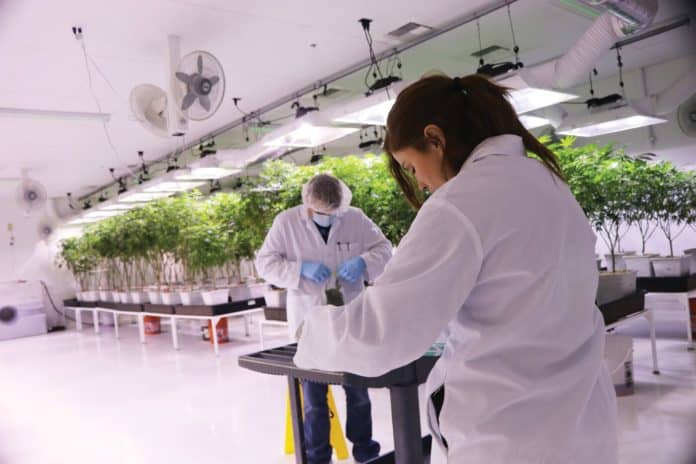Gains in the cannabis reform movement should not offset progress achieved in other arenas. The journey of environmentalists and cannabis advocates in their fight for social change has followed similar trajectories. In fact, cannabis cultivation depends on the same soil environmentalists are working to protect.
Impacting the environment
Everyone in the cannabis industry should value the dynamic between environmentally conscious actions and cannabis production. Unfortunately, that doesn’t seem to be the case. An Ithaca College study released at the end of 2017 found some commercial cannabis operations in northern California’s Humboldt County were impacting local soil quality, with many samples demonstrating higher-than-acceptable levels of volatile organic compounds. The study also discovered poor irrigation practices reduced the flow of local rivers and streams.
The situation formed part of the impetus behind the creation of Envirocann. “Envirocann development began in 2015 when the founders of SC Labs identified a need for an organic certification program in the cannabis industry,” said April Crittenden, the organization’s president. Her involvement at the intersection of sustainability and farming goes back more than a decade, to 2007, when she began working for California Certified Organic Farmers (CCOF), a non-profit that promotes organic agricultural practices. She now is director of farm programs for CCOF. In 2015, the SC Labs team approached her about developing a cannabis certification program based on the USDA National Organic Program.
She has even deeper roots in cannabis cultivation. “My parents were cultivators prior to and during the harshest enforcement of cannabis prohibition. They shifted out of cannabis production after seeing friends and family members lose everything due to law enforcement,” she said.
When Crittenden began growing medicinal cannabis in 2003, she was surprised how many growers and patients did not seem to value cannabis as an organic medicine. “As I learned more about the industry, it became clear to me that there were negative environmental impacts from production and rampant use of pesticides on cannabis produced at the time,” she said.
In 2003 the legal cannabis industry was still in its infancy. Thankfully, there now is a greater appetite for organic practices. “Now the real work lies in identifying and highlighting the producers who use sustainable practices and educating consumers about the value of certified products,” Crittenden said.
Certification and planning
Envirocann certifies farms, manufacturers, and retail outlets that are following best organic practices. The organization is focused on quality control from seed to sale. “We offer two levels of certification for growers and processors: Envirocann and EnvirOganic,” Crittenden said. Both certifications require a farm management plan, or Envirocann Management Plan (EMP) as the organization calls the certifications. The plan details the materials and methods used by grow operations, focusing on areas including resource management, equipment cleaning, and record-keeping. Data and inspections are used to determine whether a company is able to comply with certification requirements.
Envirocann will work only with companies willing to dedicate themselves to social justice. Clients must demonstrate they meet a long list of requirements, including equitable hiring practices, wages that match local cost of living, safe work environments for employees, and community outreach efforts. “Envirocann” certification indicates a producer has met state compliance requirements, uses integrated pest management practices, minimizes waste, maintains natural resources, and meets social justice components of the program. Despite the other rules, designation allows growers to “use fertility materials or plugs that don’t meet organic regulations,” Crittenden said.
Producers seeking “EnvirOganic” certification, the highest level offered by the organization, must meet additional criteria. In addition to the requirements for the “Envirocann” label, EnvirOrganic requires companies exceed national organic standards.
Neither certification is easy to achieve—and that is the point. According to Crittenden, California cannabis regulations “are the strictest you’ll find on any agricultural commodity,” she said. However, Envirocann’s standards go beyond even those. In some situations, state officials permit a low level of pesticides in agricultural products, but Envirocann enforces a zero-tolerance policy. “Our producers must not use any of these materials. Any detection negates the ability to label the product Envirocann or EnvirOganic,” Crittenden said.
Happy customers
Envirocann’s clients wholeheartedly embrace the strict procedures. Testimonials show an easily detectable pattern: Cultivators are committed to meeting the strict procedures. “While other programs operate on an honor system, Envirocann conducts multiple site visits to test for pesticide use and verify program compliance,” said Noah Levine, owner of Benson Elvis, a farm that serves dispensaries all over California.
Another producer, Frances Pavich, founder of Amigo Bob’s Seaweed Gro, feels the organization is helping build trust among retailers, processors, and consumers. “We love Envirocann’s commitment to promoting clean cannabis and sustainable growing practices,” Pavich said. “Being certified means our clients have 100-percent confidence they are using the highest-quality products held to the strictest EnvirOganic standards.”
Consumer expectations have evolved considerably over time. Awareness of how crops are raised and which ingredients are used is increasing. “There is an awakening happening as consumers become more aware about pesticide residues and contamination of products in the marketplace,” said Crittenden. “The organic industry has been one of the fastest growing agriculture sectors in the United States, even in times of recession.”
Correcting industry practices that are not eco-friendly is a necessity, but producers often need help in other areas, especially when it comes to compliance. “We built our Envirocann Management Plan as a way for producers to highlight their compliance to regulators,” Crittenden said. According to her, regulators have been pleased to work with the organization’s clients, as the information they seek is organized and ready for presentation.
Paving the way
Envirocann helps producers deal with the excessive paperwork and forms required by state regulators. “We have been asked by producers to help them navigate the licensing process, and we have been happy to do so,” Crittenden said.
If mankind wants the planet to survive, then the future undoubtedly will require a green approach. Some financial analysts predict the “Green New Deal,” a global initiative to produce a cleaner environment, not only will result in planetary health but also create jobs and revenue. Crittenden sees the merging of sustainable environmental practices with the future economy, especially for the cannabis industry, as a good thing. “This demand for products that protect earth’s natural resources has created niche markets for environmentally sustainable products,” she said.













